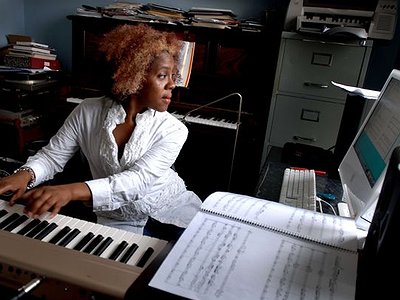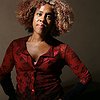Part 2
What do improvisation and composition mean to you and what, to you, are their respective merits?
All composition starts from improvisation, whether it is playing around at the piano or writing sketches into a manuscript book. It can take time to know the placement of every single note in a work. The idea of play and playfulness, of exploring and uncovering structures through physicality is the essence of composing for me. Improvisation can remain open-ended; composing fixes and distils.
Do you feel it important that an audience is able to deduct the processes and ideas behind a work purely on the basis of the music? If so, how do you make them transparent?
There are so many ideas and technicalities which go into a work that I don’t expect the listener to be able to grasp everything; it’s not necessary anyway. I want the listener to understand the spirit of the work. Occasionally I put ‘secrets’ into a work and it can give the music a certain impetus. My crafting should enable the listener to feel and remember the shape and emotion of what I have created. As a listener, my favourite music often has both mystery and precision.
With more and more musicians creating than ever and more and more of these creations being released, what does this mean for you as an artist in terms of originality? What are some of the areas where you currently see the greatest potential for originality and who are some of the artists and communities that you find inspiring in this regard?
As long as there are people there will always be music; there will always be a lot of music out there. My search isn’t to be original for the sake of it, I just need to ask the right questions in order to tell the truth of living in my time. I teach at Birmingham Conservatoire and Trinity Laban Conservatoire of Music and Dance. I am impressed that both institutions have created their own scenes where a wide range of attitudes and music-making flourishes.
How would you define the term “interpretation”? How important is it for you to closely work together with the artists performing your work?
Composition is made up of extremes of behaviour – the composer has to be able to endure long periods of solitude when they are essentially removed from the world. Then, when the piece is finished, the composer has to be able to be sociable and to communicate effectively with many different groups of strangers and become part of the experience of hundreds – and occasionally a billion people which was the case of my commissions for the London 2012 Paralympic Games (Principia and Spirit in Motion).
The LSO had to record both works in three hours without prior rehearsal. The score had to be clear, precise and correct so that the music could be represented with the minimum of conversation. Performers will always bring their uniqueness to bear on any music. I find that the clearer a score is, the more a performer will trust the composer and paradoxically be freer to perform the music well. A good work can bear many interpretations; a good performer will follow the score.
The effect of a piece doesn't merely depend on the performance of the musicians, but also on the place it is performed at. How do you see the relationship between location and sound? In how far do you feel the current system of concert halls is still the right one for your music – or for contemporary music in general?
It really helps me to know which venue I am composing for. Recently I had to compose a work for St Paul’s Cathedral — See That I Am God (commissioned to mark the 20th anniversary of the priesthood of women in the Church of England. When composing See That I Am God, I kept in mind the very, very long delay at St. Paul’s as that affects how the harmonies are heard. As well as in traditional concert halls, my music has been performed in so many other venues — a stadium, clubs, on television, radio, in pubs, on ferries, planes, an office block, community centres, churches. I recently took my own production of my opera Cautionary Tales to Latitude — so that meant performing in a tent nestled in the mud…
What's your view on the role and function of music as well as the (e.g. political/social/creative) tasks of composers today - and how do you try to meet these goals in your work?
Every composer has their own unique path to follow. Personally I feel impelled to tell the stories of my time. In many of these stories told on stage, the struggle for freedom, equality and justice is at the centre — this struggle is a timeless quest.
Do you have a musical vision that you haven't been able to realise for technical or financial reasons – or an idea of what music itself could be beyond its current form?
When I was nine years old I could hear the sound of a string orchestra with electronics; though I didn’t know that was what I was hearing then. Well, I still need to compose that work! I would like to make an album of songs composed for orchestra and various different types of voices; I would like to choreograph a dance work; I would like to make a film (script, music and direction). Because I have composed so much orchestral music, some of which (like the Cello Concerto) has only received a couple of performances, I have started to record these works — hence the new orchestral album Photography recorded with my own Orchestra X. The Cello Concerto was composed specially for the brilliant cellist Matthew Sharp and we have long wanted to record it, so we are thrilled that we have achieved this at last. I would dearly love to record my rather massive oratorio commissioned by Sarah Alexander for Welsh National Opera — CARBON 12: A Choral Symphony (John Binias, libretto).






